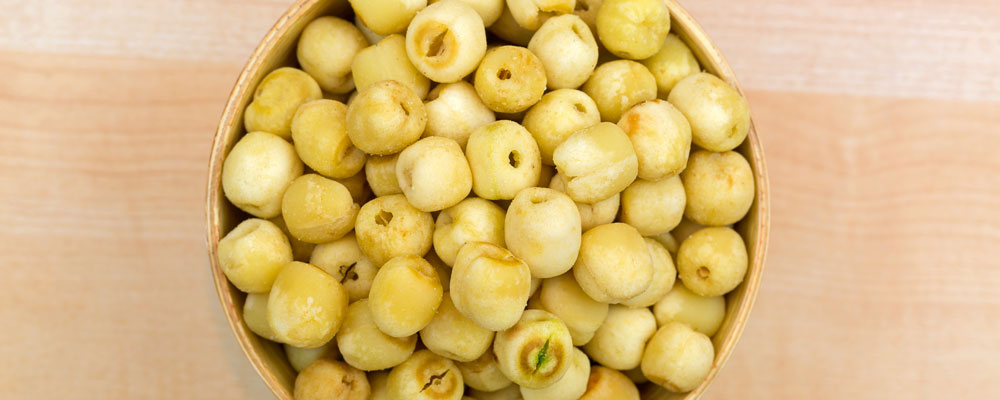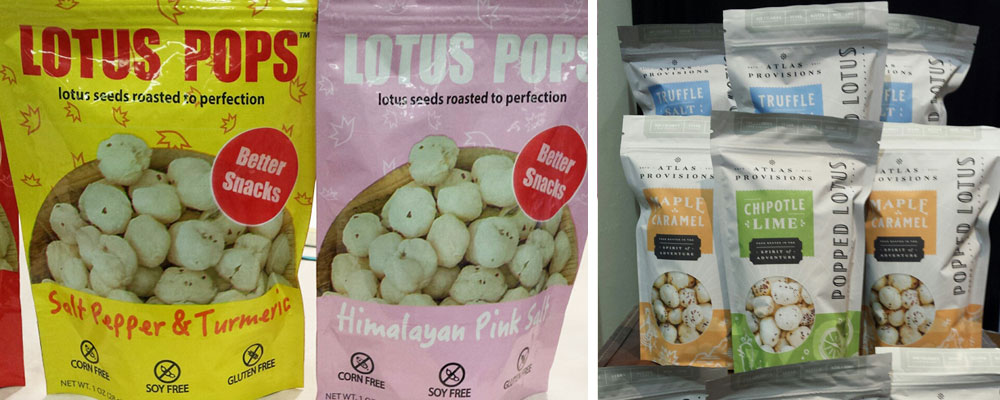
What the Heck are Lotus Seeds?
There’s an increase in healthier puffed and crunchy snacks on the market. Traditional popped corn is getting competition from popped chickpeas, sorghum, quinoa and wait, lotus seeds. What the heck are lotus seeds? You know I’m a big fan of seeds, having my book, The Need for Seeds: How to make Seeds an Everyday Food in your Healthy Diet published three years ago! However, lotus seeds weren’t on my radar then.
Lotus seeds originated in India and have long been part of traditional Indian and Chinese Medicine. As part of many Asian recipes, they can be made into a paste and flour, and then used in baking, soups and sauces. As a snack, they can be popped, puffed, roasted and candied. When I was at the Winter Fancy Food Show in San Francisco this past January, I found a few brands of lotus seeds marketed as a better-for-you snack. Let’s explore more about lotus seeds and health.
 Lotus Seeds and Health
Lotus Seeds and Health
The nutrition profile for lotus seeds is not that remarkable compared to other seeds in my book for example chia, hemp or pumpkin seeds. In 100 grams of raw lotus seeds there are 17 grams of carbohydrates, 4 grams of protein and 0.5 grams of fat (1). And they are low on key micronutrients with only 44 mg of calcium, 367 g of potassium and 168 g of phosphorus per 100 grams; and have insignificant levels of vitamin A, folate and other B vitamins.
Gut Health
Preliminary animal studies identify the resistant starch in the lotus seed may have prebiotic effects. Studies show better proliferation effects on bifidobacteria (good bacteria found in the intestinal tract), compared to native starch and high amylose maize starch (2).
In addition, lotus seeds have been linked to improvements in gut transit time, decreasing symptoms of both diarrhea and constipation (3).
Heart Health (Diabetes)
A 30-day study with rats consuming 200mg/kg bodyweight of lotus seed ash demonstrated a hypoglycemic effect within diabetic rats (4). This study reported lotus seeds having a similar blood sugar lowering effect as the drug gliclazide. It is unknown what the exact mechanism of these seeds resulted in this effect. Unfortunately, although animal studies report similar effects; there has yet to be a human trial that demonstrates lotus seed’s hypoglycemic effects. More studies must be conducted to conclude this effect in humans.
Immune Health
There have been studies that suggest lotus seeds may improve immune function within the gut by protecting gastrointestinal mucosa (3). Also, lotus seeds may have a possible pain-relieving effect. A study conducted on 48 rats demonstrated the analgesic effect of 600mg/kg bodyweight of lotus seeds (5). The higher the dose, the more pronounced the effect was found to be. This study demonstrates the potential for lotus seeds to have analgesic effects; however, there have been limited studies to conclude this finding.
What’s Next?
Overall, lotus seeds are new to the North American consumer. They are versatile with the potential of gut, heart and immune health benefits. However, more clinical studies must be conducted to solidify these human health benefits.
Remember no single food or ingredient is a silver bullet. A lifestyle filled with healthy habits including a balanced dietary pattern, exercise and restful sleep is the best approach for long-term consistent, mind body health. If you have added lotus seeds to your healthy diet, let me know your thoughts about the flavour, texture and how you use it!
Jane and her team would love to assist your company to get into the latest
better-for-you food trends or speak at your upcoming event!
Click here to learn more.
References:
- USDA Food Composition Databases: Show Foods — Seeds, lotus seeds, raw.
- Zhang Y, Zeng H, Wang Y, Zeng S, Zheng B. Structural characteristics and crystalline properties of lotus seed resistant starch and its prebiotic effects. Food Chem . 2014. Jul; 155:311–8.
- Zhang Y, Lu X, Zeng S, Huang X, Guo Z, Zheng Y, et al. Nutritional composition, physiological functions and processing of lotus (Nelumbo nucifera Gaertn.) seeds: A review. Phytochem Rev. 2015.14;3:321–334
- Mani SS, Subramanian IP, Pillai SS, Muthusamy K. Evaluation of Hypoglycemic Activity of Inorganic Constituents in Nelumbo nucifera Seeds on Streptozotocin-Induced Diabetes in Rats. Biol Trace Elem Res 2010 Dec 18];138(1–3):226–37.
- Chakravarthi PV, Gopakumar N. Evaluation of analgesic activity of lotus seeds (Nelumbo nucifera) in albino rats. Vet World 2008; 2(9.000):355–7.
Copyright © 2019 Jane Dummer | All Rights Reserved
